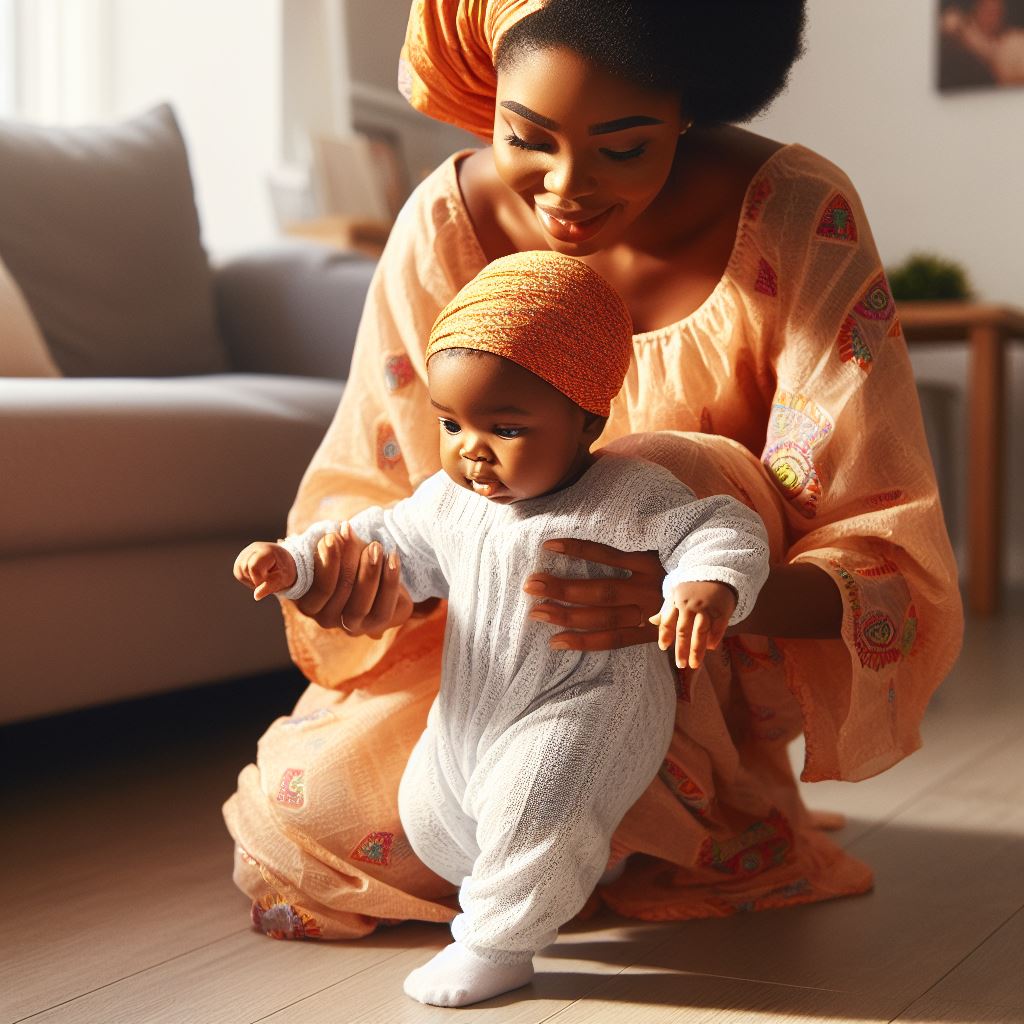Introduction
In this blog post, we will explore Baby First Steps Months.
Preparing for your baby’s first steps is an essential milestone in their development.
During the 10-12 months period, your little one will begin to explore the world around them on their own two feet.
It is crucial to understand the significance of this stage and be prepared to support and encourage your baby’s progress.
This post will provide an overview of what to expect during this exciting period.
To begin with, it’s important to create a safe and stimulating environment for your baby.
Remove any potential hazards and make sure their surroundings are baby-proof. This will give them the freedom to explore confidently.
Encouraging motor skills development is key during this time. Engage your baby in activities that promote crawling, standing, and walking.
Provide toys and objects within their reach to encourage them to move around and explore.
Offering your support and encouragement is crucial. Hold your baby’s hands and guide them as they take their first steps.
Cheer them on and celebrate their milestones to boost their confidence and motivation.
Remember that each baby progresses at their own pace. Be patient and understanding as they navigate this new stage of development.
They may fall down, but they will learn to pick themselves up and try again.
Prepare yourself for both the physical and emotional challenges that may arise during this period.
Be present for your baby, provide a nurturing environment, and cherish this remarkable journey as they take their first independent steps.
Parenting Made Just for You
Get personalized Parenting Solutions tailored to your child’s needs. Transform your parenting journey with expert guidance in 1-3 days.
Get StartedStay tuned for the next post, where we will discuss baby-proofing your home to ensure their safety as they explore!
Physical Development
A. Milestones to look out for in terms of motor skills
When your baby reaches the 10-12 months mark, they are likely to start preparing for their first steps.
This is an exciting milestone in their physical development.
Here are some milestones to look out for in terms of motor skills:
- Crawling: Your baby may start crawling on their hands and knees, exploring their surroundings.
- Pulling up: They will learn to pull themselves up to a standing position using furniture or your legs for support.
- Cruising: Once they can stand, they may start cruising along furniture, holding on for balance.
- Walking with support: Your baby might take a few steps while holding onto your hands or using a push toy.
- Standing alone: They will begin to stand independently for short periods without any support.
- First steps: Eventually, your baby will venture to take their first steps on their own.
B. Encouraging and supporting baby’s physical development
Encouraging and supporting your baby’s physical development during this time is crucial.
Here are some tips:
- Tummy time: Regular tummy time helps strengthen your baby’s muscles, especially their core muscles.
- Provide a safe environment: Make sure your home is babyproofed to prevent accidents and injuries.
- Allow exploration: Let your baby explore their environment and encourage them to reach for objects.
- Offer support: Provide a stable surface or hold your baby’s hands to help them practice standing and cruising.
- Use push toys: Push toys can assist your baby in developing their balance and coordination.
- Encourage crawling: Place toys just out of reach to motivate your baby to crawl towards them.
C. Babyproofing the house to ensure safety
Babyproofing your house is essential to ensure your baby’s safety as they become more mobile:
- Secure furniture: Anchor heavy furniture to the wall to prevent tip-overs.
- Install baby gates: Use baby gates to block stairways or restrict access to certain areas.
- Cover electrical outlets: Place outlet covers to prevent your baby from sticking their fingers or objects into them.
- Lock cabinets and drawers: Use childproof locks to prevent your baby from accessing dangerous items.
- Secure cords: Keep electrical cords out of reach or use cord organizers to prevent strangulation hazards.
- Remove small objects: Ensure small objects that can pose choking hazards are out of reach.
By following these milestones and taking steps to encourage your baby’s physical development, you are helping them reach their first steps with confidence and ensuring their safety as they explore their surroundings.
Read: Top 10 Baby Gears Every Nigerian Parent Needs
Cognitive Development
In this section, we will explore the cognitive development of babies aged 10-12 months.
This is an exciting time as they start to make significant progress in their language and communication skills development.
A. Language and Communication Skills Development
During this stage, babies begin to understand simple words and phrases, and they may even try to imitate them.
It’s important to nurture their language skills by speaking to them frequently and clearly.
- Engage in conversations with your baby, even if they can’t respond with words yet.
- Read books together and point to objects while labeling them.
- Sing nursery rhymes and repetitive songs to help them recognize patterns and learn new words.
- Use gestures and signs to reinforce verbal communication.
- Praise your baby’s attempts at communication, whether it’s babbling or using gestures.
- Expose them to a variety of sounds and voices to enhance their listening skills.
B. Encouraging Cognitive Growth Through Play and Interaction
Play and interaction play a crucial role in cognitive development.
Unveil the Perfect Name that Tells Your Family's Story
Let us help you find a name that embodies your family's values, traditions, and dreams. Our personalized consultation weaves cultural insights to create a name that's uniquely yours.
Get StartedHere are some suggestions to stimulate your baby’s cognitive growth:
- Provide opportunities for exploration and problem-solving.
- Offer age-appropriate toys that promote sensory exploration and cause-and-effect relationships.
- Play games such as peek-a-boo and pat-a-cake to enhance their understanding of object permanence and basic concepts.
- Expose them to different textures, shapes, and colors to enhance their sensory perception.
- Encourage your baby to imitate actions, such as clapping hands or waving goodbye.
- Use stacking blocks or nesting cups to introduce concepts like size, shape, and balance.
C. Introducing Stimulating Toys and Activities
A variety of toys and activities can provide the necessary stimulation for your baby’s cognitive development:
- Shape sorters: Help your baby learn about different shapes and develop problem-solving skills.
- Puzzles with large pieces: Promote hand-eye coordination and logical thinking.
- Sensory toys: Offer toys with various textures, sounds, and movements to engage their senses.
- Building blocks: Encourage your baby to explore spatial relationships and develop fine motor skills.
- Pretend play: Provide toys like dolls or kitchen sets to foster imagination and symbolic thinking.
- Musical instruments: Allow your baby to experiment with different sounds and rhythms.
Remember, each baby develops at their own pace, so don’t worry if your baby takes longer to reach certain milestones.
The most important thing is to provide a nurturing environment that supports their cognitive growth.
Stay tuned for the next section, where we will delve into the physical development of babies aged 10-12 months.
Emotional Development
In this section, we will explore the emotional development of babies aged 10-12 months.
It is an important stage where they start recognizing and responding to their own emotions, as well as those of others.
As parents, it is crucial to create a secure and nurturing environment for their emotional growth, and bonding and attachment play a vital role during this stage.
A. Recognizing and Responding to Baby’s Emotions
- Babies at this stage begin to show a range of emotions, including happiness, sadness, frustration, and excitement.
- Parents should pay attention to their baby’s facial expressions, gestures, and sounds to understand their emotions.
- Responding promptly to their emotions helps babies feel understood, valued, and secure.
- Soothing techniques like gentle touch, soothing words, and rocking can help regulate their emotions.
- Encouraging emotional expression through games like peek-a-boo or playing with stuffed toys can be beneficial.
B. Establishing a Secure and Nurturing Environment
- A nurturing environment involves providing a stable and predictable routine for the baby.
- Creating a soothing atmosphere, such as dimming lights during bedtime or naptime, can promote emotional well-being.
- Providing a safe and clean space where the baby can freely explore their surroundings strengthens their emotional development.
- Establishing consistent and loving caregiving routines helps babies feel secure and builds their trust in their caregivers.
- Being attentive and responsive to their needs helps in fostering a sense of security and emotional stability.
C. Importance of Bonding and Attachment During This Stage
- Bonding with the baby is crucial for their emotional development and overall well-being.
- Using positive touch through cuddling, hugging, and gentle massages promotes a strong bond between parent and baby.
- Engaging in eye contact, talking with a soothing voice, and mimicking their facial expressions cultivates attachment.
- Playing interactive games and sharing positive experiences strengthens the bond and builds trust.
- Parents should be patient and understanding, as developing a secure attachment takes time and effort.
During the 10-12-month stage, babies experience significant emotional development.
Recognizing and responding to their emotions, establishing a secure and nurturing environment, and building strong bonds are essential for their emotional well-being.
By providing love, understanding, and attention, parents can foster a nurturing environment that supports the baby’s emotional growth.
Read: 7-9 Months Baby Growth: What to Expect in Nigeria
Nutrition and Health
As your baby approaches the milestone of taking their first steps, their nutrition and health become even more important.
Here are some key points to consider during this stage:
A. Introducing Solid Foods and Ensuring a Balanced Diet
- Start introducing solid foods around 6 months, but consult with your pediatrician for guidance.
- Begin with single-grain cereals, pureed fruits, and vegetables to expose your baby to different tastes.
- Gradually introduce a variety of foods, including protein (meat, tofu), dairy (yogurt, cheese), and grains (rice, pasta).
- Offer different textures to help your baby develop chewing skills.
- Avoid added sugars, salt, honey, and foods that pose choking hazards.
- Breast milk or formula should still be the primary source of nutrition during the first year.
- Encourage self-feeding by offering finger foods that are safe and easy to grasp.
B. Encouraging Healthy Eating Habits
- Be a role model by eating a variety of nutritious foods in front of your baby.
- Eat meals together as a family to create a positive eating environment.
- Offer a variety of foods to expand your baby’s palate and prevent picky eating.
- Limit sugary drinks and opt for water or milk instead.
- Let your baby decide how much to eat and avoid pressuring them to finish their meals.
- Establish a routine for meals and snacks to promote healthy eating habits.
- Avoid using food as a reward or punishment.
C. Dealing with Common Health Issues During This Stage
- Teething: Provide teething toys or a chilled washcloth for your baby to chew on.
- Offer cold foods or drinks to help soothe teething discomfort.
- Use a clean finger or soft toothbrush to gently clean your baby’s teeth once they appear.
- Colds: Ensure good hygiene practices to reduce the risk of colds and other infections.
- Keep your baby’s environment clean and wash their hands frequently.
- Use a humidifier to add moisture to the air and relieve nasal congestion.
- Consult your pediatrician if your baby shows signs of illness, such as persistent fever or difficulty breathing.
Remember, every baby is unique, and it’s important to consult with your pediatrician to ensure the best nutrition and health practices for your little one.
By providing a balanced diet and maintaining a healthy environment, you’re setting the foundation for your baby’s first steps towards a happy and healthy life.
Sleep and Routine
As your baby approaches the exciting milestone of taking their first steps, it is important to establish a consistent sleep routine to ensure they are well-rested and ready for this new adventure.
Here are some tips to help you with your baby’s sleep and routine during this period:
A. Establishing a consistent sleep routine
- Create a calm and soothing bedtime routine to signal to your baby that it’s time to sleep.
- Follow a consistent schedule for naps and bedtime to regulate your baby’s internal clock.
- Make the sleep environment comfortable, with a dark and quiet room.
- Use white noise or soft music to help your baby relax and fall asleep.
- Limit stimulation before bedtime by avoiding screens and bright lights.
B. Tips for helping baby sleep better at night
- Establish a predictable bedtime routine that includes activities like bath time and reading.
- Create a sleep-friendly environment by maintaining a comfortable temperature in the room.
- Ensure your baby’s diaper is clean and dry before putting them to bed.
- Offer a small, comforting item like a soft blanket or stuffed animal for your baby to sleep with.
- Feed your baby before bedtime but avoid large meals that can cause discomfort.
C. Dealing with nap transitions during this period
- As your baby prepares to take their first steps, their nap schedule may undergo some changes.
- Observe your baby closely and look for signs of tiredness or drowsiness.
- If your baby is ready to transition to one nap a day, gradually shift their schedule by pushing their morning nap later.
- Offer quiet and calm activities during nap times to help your baby wind down and relax.
- Be patient and flexible as your baby’s napping needs may vary during this stage.
Remember, every baby is different, and it’s important to find a sleep routine that works best for your little one.
Consistency and patience are key as you navigate this stage of preparing for your baby’s first steps.
Read: 4-6 Months: Key Baby Development Stages

Supporting Independence
During the 10-12 month stage of your baby’s development, it is crucial to support their growing independence.
By encouraging self-feeding and drinking from a cup, allowing them to explore and learn independently, and promoting self-help skills, you are helping them develop essential life skills.
A. Encouraging Self-Feeding and Drinking from a Cup
At this stage, your baby is ready to take on new challenges, and one way to support their independence is by encouraging self-feeding.
Offer them small, bite-sized pieces of soft food that they can easily pick up and feed themselves.
Begin by placing food on their highchair tray and letting them explore and experiment with it.
It’s also a good time to introduce a training cup or sippy cup, as your baby will start transitioning from bottle to cup.
Offer water or breast milk in the cup during meal times, allowing them to practice holding the cup and drinking from it.
Gradually reduce their reliance on a bottle to encourage independence.
B. Allowing Baby to Explore and Learn Independently
It’s important to provide a safe and supervised environment for your baby to explore and learn on their own.
This can include creating a designated play area with age-appropriate toys and offering them opportunities to discover new textures, sounds, and objects.
While it’s natural to want to guide and protect your little one, giving them space to explore independently helps foster their curiosity and problem-solving skills.
Be nearby to provide support and encouragement, but allow them to figure things out on their own, promoting a sense of independence and self-confidence.
C. Promoting Self-Help Skills
As your baby grows, it’s important to promote self-help skills that will contribute to their independence.
Encourage them to hold their own bottle during feeding times, supporting their hand while they grasp it.
This helps develop their motor skills and increases their sense of control.
Another way to promote self-help skills is by encouraging them to pick up toys or objects independently.
Place toys within their reach and let them practice grabbing and holding onto them.
This not only strengthens their fine motor skills but also gives them a sense of accomplishment and autonomy.
Additionally, you can involve your baby in simple daily activities, such as dressing themselves with your assistance, wiping their face after meals, or helping with basic clean-up tasks.
These activities promote a sense of responsibility and independence.
In review, supporting your baby’s independence during the 10-12 month period is crucial for their overall development.
By encouraging self-feeding and drinking from a cup, allowing them to explore and learn independently, and promoting self-help skills, you are laying a strong foundation for their future growth and independence.
Social Development
During the 10-12 month period, your baby’s social development starts to bloom.
They become more interested in interacting with family members and peers, exploring new environments, and asserting their independence.
As parents, there are several ways you can support and encourage this crucial stage of their development:
A. Encouraging Social Interactions with Family and Peers
- Arrange playdates with other babies or toddlers, providing opportunities for social interactions.
- Engage in interactive games, singing songs, and reading books together to strengthen bonds.
- Encourage sharing and taking turns during playtime to develop important social skills.
- Model positive social behaviors, such as greeting others and saying “please” and “thank you.”
- Celebrate milestones like waving goodbye, clapping hands, or blowing kisses as these promote social connections.
B. Introducing Baby to New Environments and Experiences
- Take your baby to parks, playgrounds, or children’s museums to expose them to different surroundings.
- Allow exploration under supervision, letting them touch, crawl, or play with safe objects.
- Gradually introduce your baby to new sensory experiences like sand, water, textures, and sounds.
- Attend music classes, baby yoga, or baby swim lessons to stimulate their senses and socialize.
- Stay close to reassure your baby when they show signs of uncertainty or distress in new situations.
C. Supporting Baby’s Emerging Sense of Independence
- Encourage self-feeding by providing age-appropriate finger foods and safe utensils to practice with.
- Allow your baby to attempt dressing themselves, even if it takes longer or results in mismatched clothes.
- Offer choices during playtime or daily routines, helping them develop decision-making skills.
- Provide a safe and supervised environment for exploring and moving independently.
- Acknowledge and praise your baby’s achievements and efforts to boost their confidence.
It is important to remember that each baby develops at their own pace. Some may be more outgoing and sociable, while others may be more reserved.
Be patient and supportive, allowing your little one to navigate their unique social journey.
As your baby’s social skills continue to blossom, they will start to engage with the world around them more actively.
Encourage their interactions, expose them to new environments, and promote their independence.
These early experiences are crucial building blocks for their future social and emotional development.
Read: Traveling with a Baby: Feeding on the Go
Safety Measures
During the stage of 10-12 months, as your baby gets ready to take their first steps, it becomes crucial to create a safe environment for them.
Here are some common hazards and precautions to take:
A. Common Hazards and Precautions
- Sharp objects: Keep knives, scissors, and other sharp objects out of reach or securely locked away.
- Electrical outlets: Cover all accessible outlets with safety plugs to prevent electric shock.
- Small objects: Be vigilant of any small items that your baby could put in their mouth, as they pose a choking hazard.
- Medications and cleaning products: Store all medications and cleaning supplies in a high cabinet or locked drawer.
- Stairs: Install safety gates at the top and bottom of stairs to prevent falls.
- Furniture tip-overs: Secure heavy furniture such as bookshelves or dressers to the wall to avoid tipping accidents.
- Windows: Install window guards to prevent your baby from falling out or getting stuck.
- Cords and blinds: Tie up cords from blinds or curtains, as they can pose a strangulation risk.
B. Childproofing the House
Childproofing your house is essential to reduce potential risks and create a safe environment for your exploring baby:
- Cabinets and drawers: Use childproof locks on cabinets and drawers to prevent your baby from accessing hazardous items.
- Edge bumpers: Attach edge bumpers to furniture with sharp edges to protect your baby from injuries.
- Corner guards: Use corner guards on tables or countertops with sharp corners to minimize the risk of bumps.
- Outlet covers: Install outlet covers on all accessible electrical outlets.
- Door safety: Place finger-pinch guards on doors to prevent your baby’s fingers from getting trapped.
- Secure heavy objects: Anchor heavy objects like TVs or bookshelves to the wall to prevent toppling.
C. Supervising Baby’s Activities
While creating a safe environment is essential, it is equally important to supervise your baby’s activities closely:
- Never leave your baby unattended on high surfaces such as changing tables or sofas.
- Stay within arm’s reach when your baby is learning to walk or crawl.
- Be cautious around water, never leave your baby alone in the bathtub or near a pool.
- Be mindful of pets. Monitor interactions between your baby and any pets in the house.
- Keep an eye on your baby during meal times to prevent choking hazards.
- Ensure the environment is free from hot liquids or foods that could burn your baby.
By being aware of the common hazards and taking necessary precautions, childproofing your house, and providing constant supervision, you can create a safe environment for your baby as they approach the exciting milestone of taking their first steps.
Celebrating Milestones
When it comes to your baby’s first steps and other important milestones, documenting them is essential.
These milestones mark significant achievements in your baby’s development, and they deserve to be celebrated and cherished.
Here are some ideas to help you celebrate and capture these precious moments:
A. Documenting Baby’s First Steps
- Keep a camera or smartphone handy to capture the very moment your baby takes those first few steps.
- Record a video to document this milestone. You can later share it with family and friends.
- Create a scrapbook or baby journal where you can write down the details and include photos.
- Consider creating a dedicated social media account for your baby, where you can showcase their milestones.
B. Celebrating Achievements
- Throw a small celebration at home with close family members, complete with balloons and a special cake.
- Invite friends over for a playdate and let them join in the celebration.
- Organize a baby milestone party, inviting friends and family to rejoice in your baby’s achievements.
- Give your little one a small gift as a token of celebration, such as a toy or a book.
C. Providing Positive Reinforcement
- Praise your baby for their efforts and offer words of encouragement whenever they accomplish a new milestone.
- Use positive reinforcement techniques like clapping, cheering, or giving high fives to show your baby how proud you are.
- Give your baby lots of hugs and affection to reinforce their confidence and self-esteem.
- Display your baby’s achievements at home, such as framing the first steps photo or hanging up artwork.
D. Sharing Joy and Excitement
- Share the news of your baby’s milestone on social media platforms to include distant friends and relatives.
- Send out personalized announcements or cards to close family members, inviting them to celebrate in person.
- Create an online photo album or blog to document your baby’s milestones for everyone to follow.
- Host a virtual gathering over video call, where loved ones can see your baby in action and congratulate them.
Celebrating milestones is not only a way to acknowledge your baby’s achievements, but it also allows you to share your joy and excitement with others.
It creates a sense of community and support as you navigate through the beautiful journey of parenthood.
So, make sure to embrace the milestones and create lasting memories along the way!
Conclusion
In this blog post, we have discussed the importance of preparing for baby’s first steps during the 10-12 months stage of their development.
We have covered key points such as choosing appropriate footwear, creating a safe and conducive environment, encouraging physical activities, and providing emotional support.
Preparing for baby’s first steps is crucial as it not only promotes their physical development but also boosts their confidence and independence.
So, parents, don’t worry if your baby hasn’t taken their first steps yet – every child develops at their own pace.
Continue providing a supportive and nurturing environment. Before you know it, your little one will be walking and exploring the world around them!
Remember, it’s a beautiful milestone in your baby’s life, and you’re doing a great job as parents!




